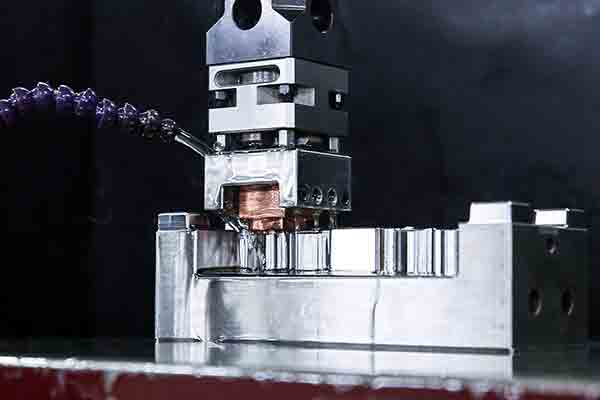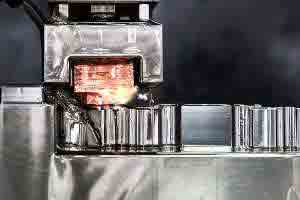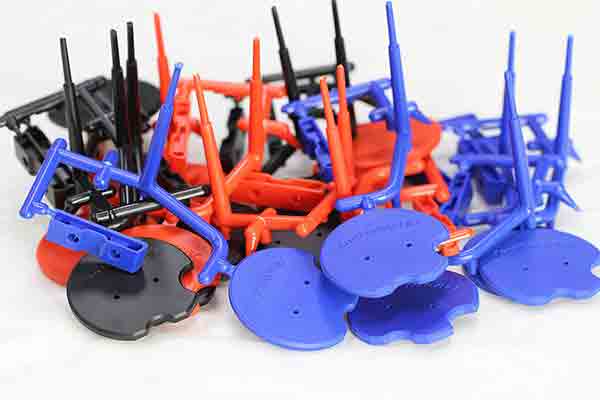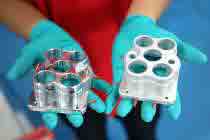
As part of our ongoing mission to improve the quality of our rapid tooling service, the team at Michigan CNC Machining Parts, Inc. has moved away from using aluminum for plastic injection mold tools and we now use steel such as P20, NAK80, S136 and H13 instead.
We did this because we’ve found that there are too few compelling advantages to using aluminum for rapid prototyping tools and too many drawbacks.
Aluminum is Not Less Expensive
All tooling raw material is priced by weight. Compared to P20, aluminum is not as dense so you will consume less of it. But aluminum has a much higher price per kg. Although you use less material you end up paying more for it and in the end the final tool price comes out the same.
Aluminum is Not Stronger
Generally, all tool steels are harder and tougher than aluminum. This means they can withstand higher injection pressures for more cycles and they’re less likely to be deformed or otherwise damaged by flashing.
Because of this greater strength, it’s also possible to engineer a tool that is still strong while consuming less material. This can be a potential cost savings over aluminum.
Aluminum is Harder to Repair
Should a tool need to be repaired, it’s easier to do that with any steel than it is with aluminum. Aluminum welds are more porous and it simply takes a lot more time and trouble to get good results.

Aluminum is More Difficult to Polish
Polished mold cores and cavities make glossy finished parts. To achieve this polish, the tool has to go through successive stages of grinding and sanding. Because aluminum is a soft metal it’s much easier to damage the surface by applying excessive pressure, which is not a problem with steel. That also means the finished aluminum tool must be handled more carefully.
Aluminum Is Only Good for Short Runs
Considering an aluminum tool for production runs requires a trade-off between efficiency and longevity. Aluminum has a higher heat transfer coefficient, so that it heats up and cools off faster. This can translate to faster cycle times and therefore slightly reduced production costs.
But this calculation only works for short runs and small volumes. On longer runs, the tool will heat up too much and be damaged. Therefore it will require cooling channels, and that increases the cost and complexity of the tool to the point where it no longer makes financial sense. Steel will last longer and is worth the investment, aluminum is not.
Aluminum Tools are Not Faster to Make
Aluminum has a higher machinability index so it cuts faster than steel. However, material removal is only a small part of overall production lead time.

Rapid tools are basically prototypes. That means each tool is unique and is being made for the first time. Great care must be taken to get the job right.
Therefore you must consider job set-up and fine-tuning, programming, machine movement (sometimes called “machine air time”, when the cutter is being repositioned but is not removing stock), first article inspection, etc. These all take the same time no matter the material, reducing the machinability advantage of aluminum.
With modern, high-speed coated cutting tools operating within a lean factory, we can produce a finished P20 steel tool nearly as fast as aluminum with all-around better results.
In addition, our steel machine tool blanks come from the supplier already precision machined in the exact size we need for production. That means we can start cutting out the core and cavity right away.
By contrast, aluminum blanks must first be milled to standard size before we work on the cavities, further slowing the process down.
The move towards using steel instead of aluminum has simplified our supply chain and helped us to streamline our manufacturing processes for greater efficiency and faster turnaround times. You get a better tool that lasts longer and produces a superior part.
So yes, our competitors and many people still advocate for aluminum tooling but when it comes to giving our customers the quality they deserve we believe steel is the future and that aluminum tools are indeed dead.
Upload your product design files for a free quotation if you’d like to see for yourself that when it comes to quality, we are the supplier of choice.
Chris Williams is the Content Editor at Michigan CNC Machining Parts, Inc.. He is passionate about writing and about developments in science, manufacturing and related technologies. He is also a certified English grammar snob.




